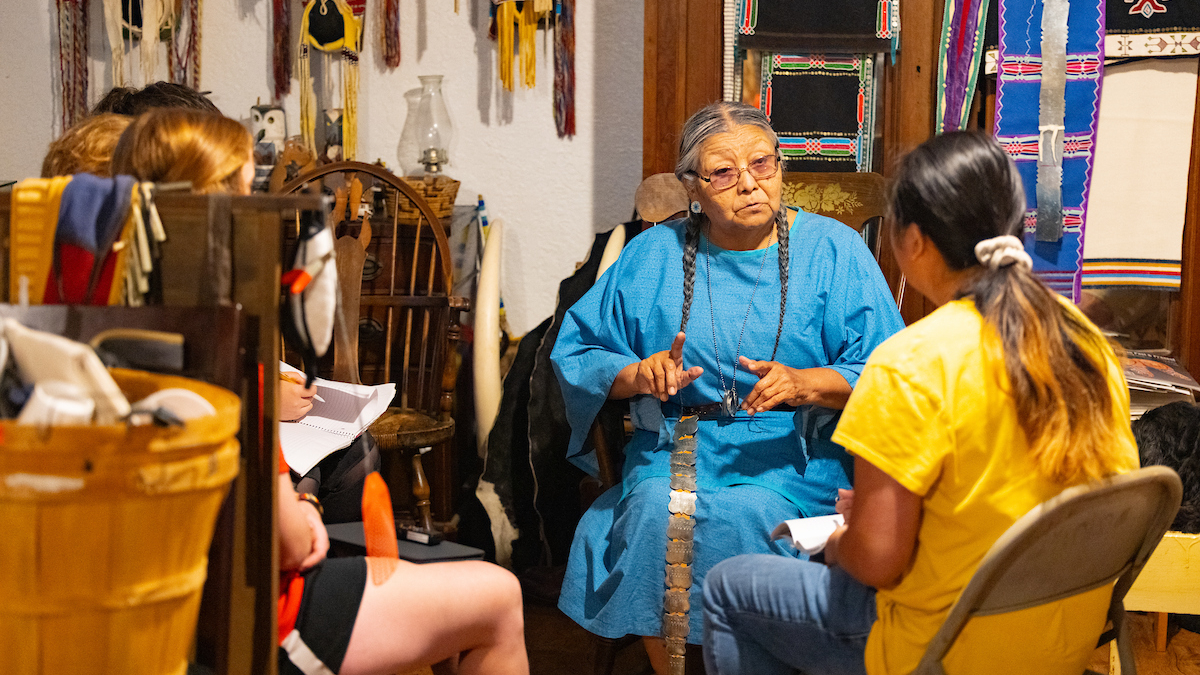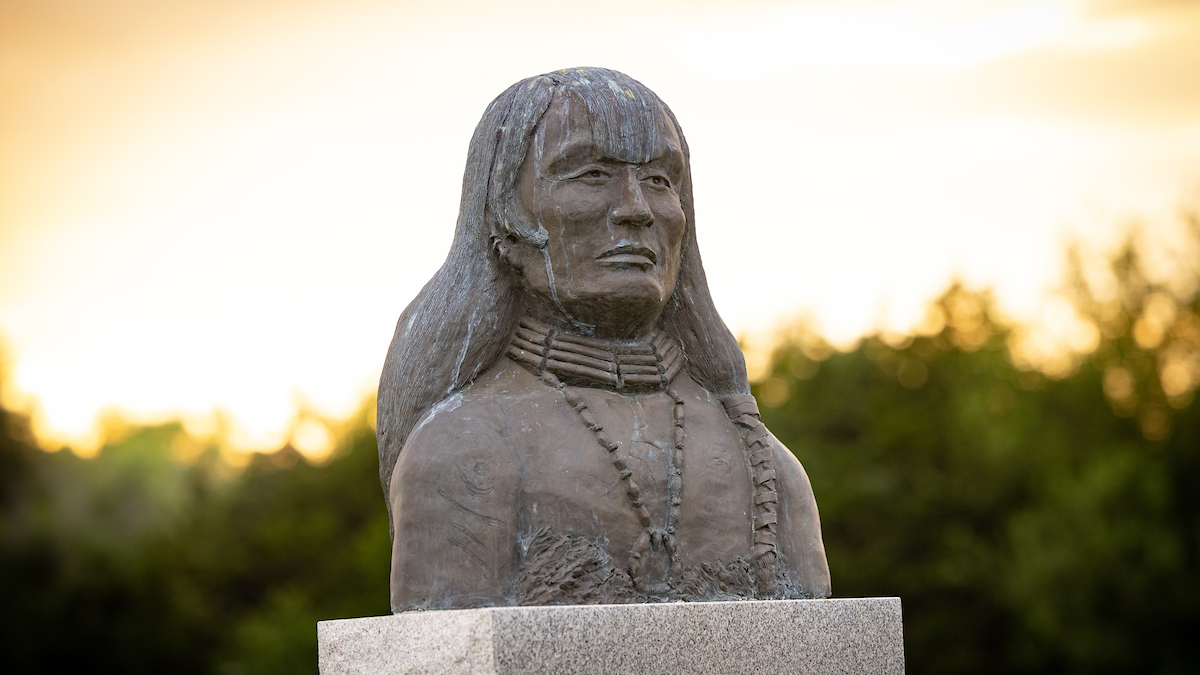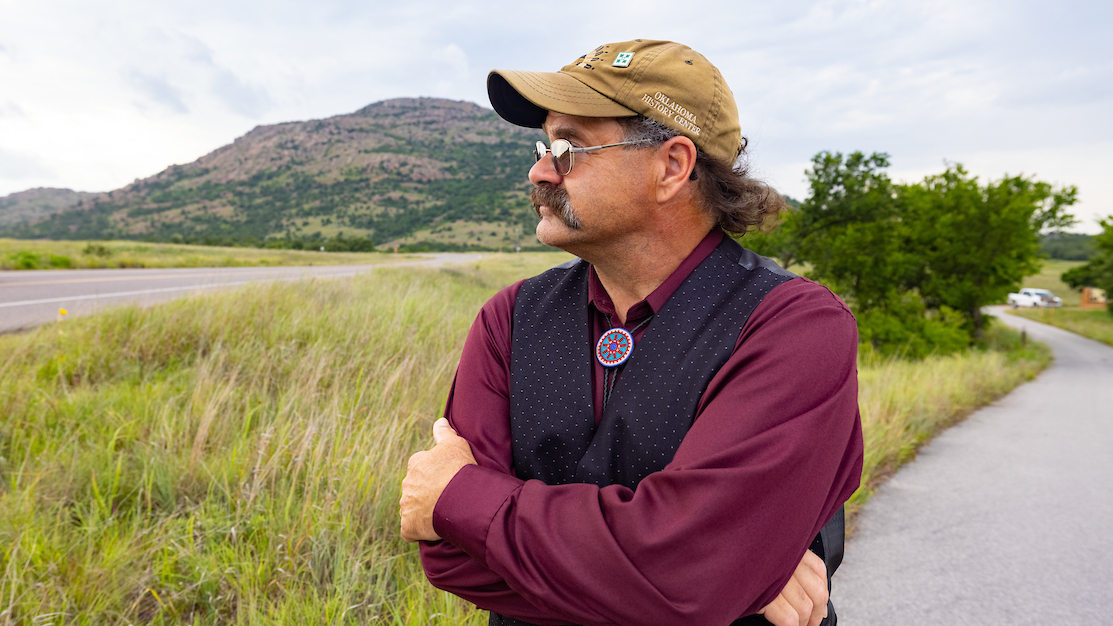Code talking: Shining a light on war-time heroes
Meadows, professor of anthropology and Native American studies at Missouri State University, works with many Native American tribes and cultures. He also studies Japan.
From a military family, early in his career he became interested with the military experience of indigenous peoples.
As he unearthed more about the ceremonies, music and art associated with these veterans, he discovered a largely unstudied area of history: code talkers from many Native American tribes. While the Navajo were well-known, over 30 other groups were not.
“I stumbled upon it myself,” Meadows said.
He was interviewing a Comanche World War II veteran, then in his 70s, when the man mentioned he served as a code talker.
“With the reality of mortality, I knew they wouldn’t be around to share their stories much longer,” Meadows said. “I dug in immediately interviewing all of the guys.”

As part of an ethnographic field school, students interview Vanessa Jennings of the Kiowa tribe.
This tenacity to uncover more and the humility to pivot directions to preserve important cultural experiences earned Meadows respect from many tribes, according to Vanessa Jennings. She is a Kiowa U.S. National Heritage Fellow.
“It is amazing to watch him record and document ancient information from these elders,” Jennings said. “Each bit is more information for the unborn generations to learn of our beautiful Kiowa culture.”

Dr. Bill Meadows takes his students to museums and memorials that honor Native Americans.
Congressional recognition
Much of what the general public knows about the code talkers’ contributions to military action has only been exposed in the last 20 years. This coincides with Meadows’ publications and the production of the film “Wind Talkers.”
“A lot of them had blessing ceremonies done before they left. Some carried traditional medicines into combat. They’ve shared the songs that were sung for them.”
In fact, Meadows testified before Congress in 2004. This contributed to the passage of the 2008 Native American Code Talkers Act. This act awarded congressional medals for all code talkers of both world wars.
Lobbyists distributed Meadows’ books to senators and representatives to educate and persuade them to provide recognition for other tribes. After hearing sufficient evidence, Congress can honor other groups in the future under the same act.
“The code talkers never went looking for this recognition,” it was their tribes, relatives, scholars and others, Meadows said.
After recently completing a book on WW I code talkers, he is working on a WW II volume.
With his deep roots in these tribal communities, he continues to receive tips. He hopes to identify and facilitate recognition for all tribes that participated – to make sure they are not obscured from history.
Decoding code talking
“Code talking allowed you to provide commands and plans on the open airwaves,” Meadows said. “Anybody could listen to it. But it was pretty much unbreakable.”
The languages were largely unknown, not written down and non-European based, he added.
Code talking entailed sending military communications in native languages. Some tribes also developed extensive coded vocabularies of newly formed words for military subjects, like tanks and artillery. At other times, they translated native words as alphabets to spell out proper names.
No matter which process was used, it saved hours of encoding and decoding. And in war time, hours saved lives.
None of the Native American codes were ever broken.
This slideshow requires JavaScript.
The Native American experience
Meadows evaluates more than how the tribes communicated. He also explores the ceremonies, myths, stereotypes and racism they experienced.
One of the most common myths was that all code talkers were sworn to secrecy. While the Navajo were, Meadows says dozens of newspaper articles widely shared information about other groups.
“I’m a collector and facilitator of information.”
Many today believe the code talkers weren’t U.S. citizens when they volunteered or were drafted in WW I. However, Meadows discovered that about two-thirds were.
He’s also been able to dispel the myth that all Native Americans in the world wars served as code talkers. Instead, they filled many ranks. Unfortunately, many had to confront the stereotype of the “super scout.”
“They were put in very dangerous positions and often told to take the lead. It was assumed they could run without making a sound and see better at night,” he said.
Fighting stereotypes
In the Pacific Theater of World War II, code talkers were treated well and even admired in their units. However, some were mistaken as Japanese and captured by other U.S. troops when not with white soldiers.
“Without the internet, travel and cultural awareness we have today, American Indians, Chinese, Korean, Filipino and even some Hispanics were confused as Japanese.” In the Pacific during WW II, “almost anybody that didn’t look European was confused as Japanese,” Meadows said.
All were eventually identified and released. Some had bodyguards assigned to prevent misidentification.

Dr. Bill Meadows overlooks a student field trip learning about Native Americans.
Relationships and recognition
“Dr. Meadows has provided both the Indian and non-Indian worlds with a small piece of written history that was only known through oral stories,” Lanny Asepermy said.
Asepermy is Comanche, a retired Master-Sergeant of the U.S. Army and Vietnam veteran. He has known Meadows for 20 years.
Meadows feels gratified that his books, along with the Native American Code Talker Act, will ensure Native American veterans will be remembered.
For him, the relationships and the cultural recognition make the job as worthwhile as the day he started.
“The Comanches gave me a Pendleton (Grateful Nation) blanket, which has stripes of all the military campaigns,” he said. “They said, ‘We have never given one of these blankets to a non-veteran. You’re the first and you’ll probably be the only one.’”
- Story by Nicki Donnelson
- Photos by Kevin White
- Video by Chris Nagle


One Response